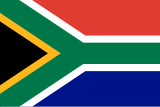National Horseracing Authority
This article needs additional citations for verification. (February 2021) |
 | |
| Predecessor |
|
|---|---|
| Type | Horseracing Regulatory Body |
| Purpose | Horse racing |
| Headquarters | Turf Club Street, Turffontein 2190 |
Region served | South Africa |
Chairperson | Susan Rowett[1] |
Chief Executive | Vee Moodley[2] |
| Affiliations | International Federation of Horseracing Authorities |
| Website | www |
Formerly called | The Jockey Club of Southern Africa |
The National Horseracing Authority of Southern Africa (NHA), formerly the Jockey Club of Southern Africa, is the Southern African equivalent of the American and British Jockey Clubs. The main purpose of the National Horseracing Authority is to prevent malpractice and corruption in South African horse racing. The organisation is established by an act of parliament in South Africa, and regulates the thoroughbred horse racing industry in South Africa.
The organisation's motto is "maintaining the integrity of the sport of horse racing",[3] and its primary source of funding is Phumelela and Gold Circle, two South African horse racing companies.
History
The organisation was formed in 1882, when a group of 10 influential figures from South African horse racing met in the Phoenix Hotel in Port Elizabeth to form an organisation to regulate the sport and disputed that arose. The organisation became known as The Jockey Club, named after its counterpart in the United Kingdom that had been established some 100 years earlier. The name "The Jockey Club" did not refer to the current sense of jockeys; in the 18th century, "jockey" referred to anybody who managed or dealt with horses.
The organisation changed its name to the National Horseracing Authority on 19 January 2004.
Horse racing activities are controlled on a regional level as well as a national level. South Africa is divided into four racing districts, with Zimbabwe as the fifth. The organisation has 670 members who elect the 11 Head Executive Stewards who govern the Jockey Club structure.
Rules and inquiries
The NHA enforces the rules of horse racing, designed to deal with all aspects of racing from the care of horses to serious malpractices like doping of horses. Many of the rules are unchanged since 1882. In order to enforce these rules, the NHA employs a number of Stipendiary Stewards ("Stipes"), who are present at every race meeting and use video equipment to help detect any incident that might need investigating.
Inquiries are opened into any matter which appears to be suspicious, and if anybody is found guilty of breaking the rules, the Stipes have the authority to impose penalties ranging from a reprimand to a total ban from racing. Those found guilty can appeal to the Appeal Board, an independent body, if they disagree with the decision.
The NHA operates its own laboratory to test specimens from horses in every race to detect the use of drugs. Some critics[who?] complain that the drug screening used is too sensitive, and detects minute quantities of drugs which could not affect a horse.
Licensing
Another part of the NHA's role is the licensing of jockeys, trainers and race meeting officials, and the granting of colours to anybody who qualifies to own and race horses.
Computerised administrative records are kept of over 270 trainers, 200 jockeys and apprentices, 9,000 owners and 8,000 horses in training. The Registrations Department also records over 10,000 renewals, changes of horse ownership and leases each year.
Breeding
The NHA also monitors the horse breeding industry. Before any thoroughbred foal can be recorded in the General Stud Book, the mare owner, stallion owner, mare and stallion must have been registered before the foal was born. The breeder must also provide detailed information relating to the time the mare was covered, the time the foal was born and the identity of the foal. A laboratory in Onderstepoort blood types every foal and confirms its parentage, to ensure that horses are pedigree as claimed.
Jockey Academy
The NHA also recruits and trains apprentice jockeys. The original Jockey Academy, founded in 1958, operated from a house on the Berea, a suburb of Durban. In 1972, the S.A. Jockeys Academy, designed by the rugby player Tommy Bedford, opened on 8.1 hectares (20 acres) of land adjacent to Summerveld, built to accommodate 40 apprentices. The number of apprentices at any one time is determined by the needs of the racing industry.
During five years as an apprentice, trainees are given a comprehensive education and taught the necessary skills to become a competent rider. Graduates of the academy include Michael Roberts, Jeffrey Lloyd, Felix Coetzee, Robbie Sham and Bartie Liesher.
Racetracks
- Arlington Racecourse (Port Elizabeth) - no longer operational
- Clairwood Park (Durban) - no longer operational since 2012
- Durbanville Racecourse (Cape Town)
- Fairview Racecourse (Port Elizabeth)
- Flamingo Park (Kimberley)
- Greyville Racecourse (Durban)
- Kenilworth Racecourse (Cape Town)
- Scottsville Racecourse (Pietermaritzburg)
- Turffontein Racecourse (Johannesburg)
- Vaal Racecourse (Sasolburg)
 Borrowdale Park (Harare)
Borrowdale Park (Harare)

